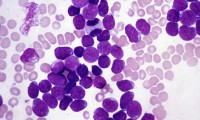-
Scientists discover way to halt breast cancer spread
- Source: pharmatimes
- 527
- February 11, 2018
-
AstraZeneca’s PARP inhibitor gains market edge with breast cancer approval
- Source: Biopharmadive
- 584
- January 17, 2018
-
Immune Cells Play Key Role in Early Breast Cancer Metastasis Even Before a Tumor Develops
- Source: mountsinai.org
- 544
- January 16, 2018
-
FDA approves first treatment for breast cancer with a certain inherited genetic mutation
- Source: finance.yahoo
- 549
- January 15, 2018
-
Artificial Intelligence Could Help in Breast Cancer Diagnosis
- Source: healthline
- 649
- December 19, 2017
-
Are These Four Viruses Present in Breast Tissue before Breast Cancer? – Medical News Bulletin
- Source: medicalempires
- 534
- November 24, 2017
-
New genetic variants contribute to the risk of breast cancer in women, study reveals
- Source: news-medical
- 479
- October 25, 2017
-
Cholesterol byproduct hijacks immune cells, lets breast cancer spread
- Source: Medicalxpres
- 721
- October 13, 2017
-
FDA approves new treatment for certain advanced or metastatic breast cancers
- Source: fda.gov
- 879
- September 30, 2017
-
Cynvenio Biosystems initiates breast cancer monitoring study in US
- Source: medicaldevice-network
- 559
- August 22, 2017
your submission has already been received.
OK
Subscribe
Please enter a valid Email address!
Submit
The most relevant industry news & insight will be sent to you every two weeks.













